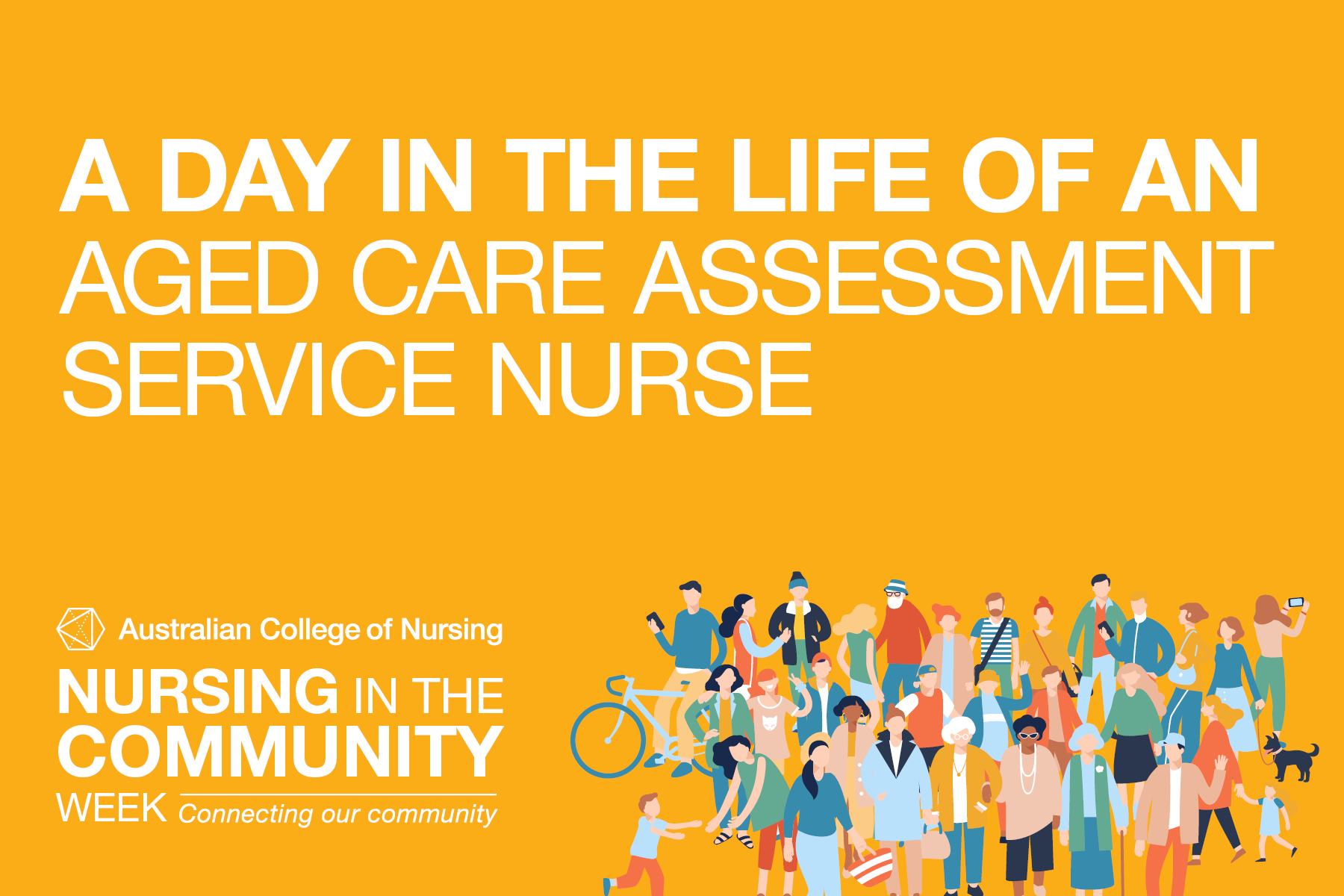Each year in September, the Nursing in the Community Faculty celebrate Nursing in the Community Week to highlight the valuable and sometimes hidden ways nurses contribute to the community. As part of the 2022 celebrations, three community nurses have shared what a typical day in their life is as part of NurseClick’s A Day in the Life series.
Today is Rachel McKittrick MACN, who is sharing with us what a day is like working with the Aged Care Assessment Service.
Who is Aged Care Assessment Service (ACAS)?
Many nurses might in some way be aware of the Aged Care Assessment Service (ACAS) from reading about them in patient notes or referring a patient/client to them. Also known as the Aged Care Assessment Team (ACAT), depending on what state or territory of Australia you are from, I’ll refer to ACAS here as it’s what I am familiar with.
ACAS assesses people’s eligibility for Commonwealth funded aged care – commonly Residential Care (including Residential Respite and Permanent Residential Care), Home Care Packages (HCP) Levels 1 to 4 and the Transition Care Program (TCP).
Eligibility criteria for each care type is described in a set of legislation, principles and guidance, overarched by the Aged Care Act 1997 (Commonwealth). ACAS also develops support plans with people, based on their assessment, which might involve referral to Commonwealth Home Support Program (CHSP) services and more.
ACAS teams are multidisciplinary. Registered nurses, physiotherapists, occupational therapists, social workers and more are involved as Assessment Clinicians, with geriatricians supporting the team. Individual Assessment Clinicians conduct a person’s ACAS assessment, with a geriatrician getting involved if medical input is needed.
All assessments go through a process whereby a colleague with additional training and appointed as a “delegate” of the Commonwealth, must agree with the Assessment Clinician’s recommendation regarding eligibility for the relevant aged care type (and the Commonwealth funding that goes with this).
There is also a multidisciplinary case-conferencing system, where people with complex care needs or other vulnerabilities are presented, so their situation benefits from other disciplinary perspectives.
Assessments take about 90 minutes, preferably in a person’s home because more understanding is gained about a person’s care and support needs when seen in their own environment, as opposed to a hospital ward or consulting room. However, assessments sometimes occur in hospital to support discharge planning.
A typical day involves…
- A quick check of the calendar to see who I’m scheduled to assess that day, taking in a brief overview of each client’s referral reason/health history/current care situation, then heading out the door to visit these clients at their home.
- To start, I often need to reassure clients the assessment is not about sending them to a nursing home – a fairly common fear of people. It is important to take the time to make it clear it is about starting them on the journey to find the best aged care type to help them stay at home, wherever possible.
- There is lots to get through in the form a comprehensive assessment across social, health, functional, cognitive, psychological, and home setup dimensions of a person’s situation. This is done by skilfully asking the necessary questions, taking in other cues from the person and their environment, and collecting information from important carers and family.
- Developing a support plan comes next, including agreeing on key issues and appropriate options within the scope of the aged care system. Lots of education about the aged care system goes with this step.
- Then it is back to the office to write up assessment reports, and, where needed, liaising further by phone with the person, carers, family or services I am referring to.
What I love about working with ACAS
The pace and seemingly ever-increasing complexity of the clientele ACAS works with is a challenging part of this role, but there are many positives. To name a few:
My ACAS team is made up of clinicians with an absolute wealth of aged care clinical and system knowledge and experience, and we really strive to be person-centred despite the constraints of the system. I am always learning from my colleagues, not least because of the multidisciplinary make-up of the team.
The opportunity to interact with a wide variety of people from so many different walks of life and parts of the world is such a privilege and enriches my own world view hugely. I am sure many nurses feel this way.
Again, like many nurses, I appreciate doing a role where I can make a difference in a person’s life. Perhaps by providing information about the complicated aged care system in a way that person can understand, they feel just that bit more informed or even empowered, or referring them on to the next service for the support they need. They may be ‘simple things’ that I hope make a big difference to people’s lives as they age, which can be challenging for some.
Rachel McKittrick MACN (RN, BAppSci, MPH, PhD Candidate)
Rachel’s clinical experience has been gained from working in various community-focused nursing roles in different health and aged care settings. Further study has led Rachel to presently be undertaking a PhD, which includes investigating workforce requirements including what the RN role is for community aged care settings. Rachel enjoys continuing to work clinically alongside this study, with the Aged Care Assessment Service, and she is also part of the ACN Nursing in the Community Faculty Leadership Team.






